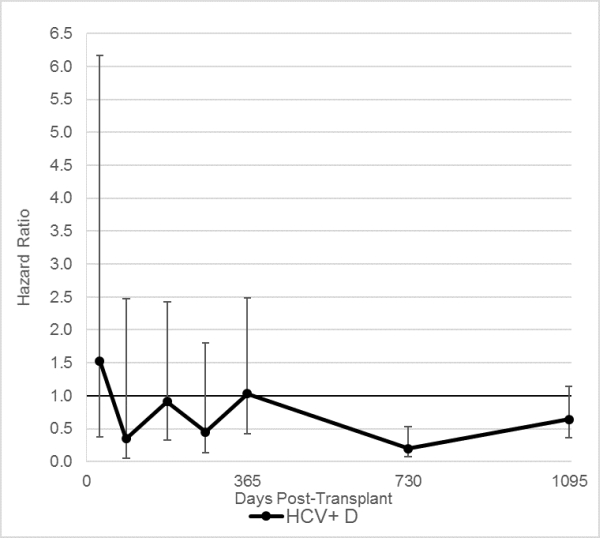Mortality and Kidney Transplantation Outcomes among Chronic Dialysis Patients Who Are Seropositive for Hepatitis C Virus
D. Sawinski,1 F. Kimberly,1 L. Vincent,1 S. Justine,1 B. Colleen,1 C. Jordana,1 G. David,1 L. Jayme,2 W. Joe,3 R. Peter.1
1Univ of Pennsylvania, Philadelphia, PA
2Univ of Alabama, Birmingham, AL
3DaVita, Minneapolis, MN.
Meeting: 2018 American Transplant Congress
Abstract number: 41
Keywords: Hepatitis C, Kidney transplantation, Outcome
Session Information
Session Name: Concurrent Session: Kidney Infectious - Viral Hepatitis
Session Type: Concurrent Session
Date: Sunday, June 3, 2018
Session Time: 2:30pm-4:00pm
 Presentation Time: 2:42pm-2:54pm
Presentation Time: 2:42pm-2:54pm
Location: Room 4C-4
Hepatitis C virus (HCV) infection is common among patients receiving chronic dialysis. However, few studies have examined both survival on dialysis as well as transplantation outcomes for HCV-seropositive patients, partly due to lack of information about HCV-serostatus in large registry datasets.
Methods: We performed a retrospective cohort study for patients receiving hemo- and peritoneal dialysis between 1/1/2004 – 12/31/2014. We linked detailed data that included HCV antibody serostatus from a national dialysis provider with transplant registry data from the Organ Procurement and Transplantation Network. We used Cox and cause-specific hazards regression to determine hazard ratios (HRs) of all-cause mortality, kidney transplant wait-listing, and kidney transplantation associated with HCV seropositivity.
Results: Among 442,171 dialysis patients, 31,624 (7.2%) were seropositive for HCV. HCV seropositivity was associated with a small elevation in the risk of death (aHR 1.09, 95% CI 1.07-1.11) but a substantial reduction in access to the kidney transplant waitlist (sHR 0.67, 95% CI 0.61 – 0.74). Once waitlisted, HCV-seropositive patients underwent transplantation as rapidly (sHR 1.10, 95% CI0.96-1.27) as HCV-seronegative patients. Compared to remaining on dialysis, HCV-seropositive patients lived longer with kidney transplantation, with better survival evident by 9 months after transplant. Importantly, as in Figure 1, the strategy of accepting an HCV-seropositive donor kidney (HCV+D) provided a survival advantage by 2 years compared to the option of remaining on the waitlist or receiving an HCV-negative donor kidney.
Conclusion: HCV-seropositive dialysis patients with HCV have reduced access to the kidney transplant waitlist, despite deriving a significant survival benefit from transplantation. These patients and their physicians should carefully consider the benefits of accepting kidneys from donors with HCV. 
CITATION INFORMATION: Sawinski D., Kimberly F., Vincent L., Justine S., Colleen B., Jordana C., David G., Jayme L., Joe W., Peter R. Mortality and Kidney Transplantation Outcomes among Chronic Dialysis Patients Who Are Seropositive for Hepatitis C Virus Am J Transplant. 2017;17 (suppl 3).
To cite this abstract in AMA style:
Sawinski D, Kimberly F, Vincent L, Justine S, Colleen B, Jordana C, David G, Jayme L, Joe W, Peter R. Mortality and Kidney Transplantation Outcomes among Chronic Dialysis Patients Who Are Seropositive for Hepatitis C Virus [abstract]. https://atcmeetingabstracts.com/abstract/mortality-and-kidney-transplantation-outcomes-among-chronic-dialysis-patients-who-are-seropositive-for-hepatitis-c-virus/. Accessed February 12, 2026.« Back to 2018 American Transplant Congress
